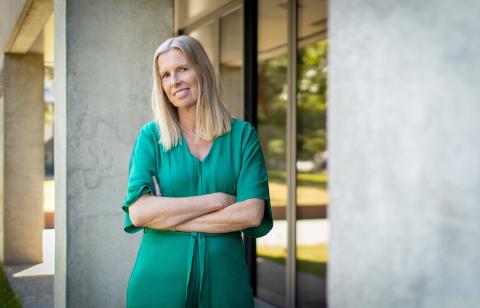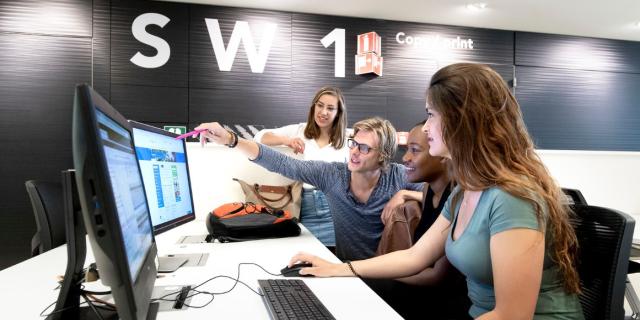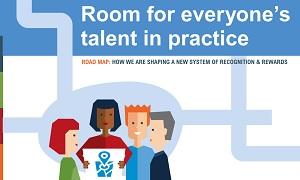Where we are now
On this page you can find information about the concrete steps being taken to implement the new way of recognizing and rewarding within Tilburg University.
Room for everyone's talent in practice
On April 4 2023, the national Recognition and Appreciation Program Team published a Roadmap. With it, the Dutch academic institutions jointly make clear how they want to shape the Recognition and Appreciation program in the coming years. At Tilburg University we are also engaged in various activities to adapt our way of recognizing and valuing to the developments that academic work has gone through in recent decades.
In the coming years, you will notice the following from the spearheads included in this Roadmap
Diversification and vitatisation of career paths
The various Schools have been working on how to differentiate within academic job profiles. This was one of the spearheads for 2023. For example, within a team or organizational unit, one person is very good at offering education, another is happy with management, and a third is extremely good at formulating scientific research questions. Not everyone has to be equally good at everything, but every contribution deserves recognition. This applies to academic staff, but actually to all university employees who make our scientific work possible. In this way, each School creates career policies that are in line with its vision and its fields, and with the principles of Recognition & Rewards.
In 2021,Tilburg University already introduced the new Performance & Talent Development (P&TD) cycle, focusing on the various core domains: Management, Education, Research, Impact, and Team Spirit (MERIT).
Achieving balance between individuals and the collective
The better you assemble teams with employees who have different talents, skills, and ambitions the more likely you are to achieve the common goal. One way to think about the future composition of your School, organizational unit, or Division, for example, is through Strategic Personnel Planning (SPP). In it, organizational units or teams describe, based on their vision and mission, what specific skills and talents they need to realize it. A number of organizational units at Schools and the Central Services have already started Strategic Personnel Planning pilots or intend to do so in the near future. The goal is to complete these by the summer of 2023 and develop best practices based on the findings that Departments/ Divisions can use.
Within Tilburg University, team spirit (academic citizenship) is one of the core areas of Recognition & Rewards, and it is also one of the core areas within the P&TD cycle. It is also important that managers and employees have “the right conversation” about development wishes and opportunities within the team or Division. Strategic Personnel Planning is an important tool to make this transparent.
Focusing on quality
Over 500 scientific institutions within and outside Europe, including Tilburg University, have signed the Agreement on Reforming Research Assessment. In doing so, they agree not to make inappropriate use of criteria to determine the quality of scientific work. This immediately raises the question: but what, in actual fact, are good quality criteria for research, education, leadership, or impact, taking into account differences between disciplines? In 2023 and 2024, Academic Services is tackling this question, making use of the knowledge that other universities at home and abroad are also developing on this subject.
As part of differentiating academic careers, criteria for recruitment, development, appointment, and promotion will also be reviewed. Training has been developed for selection committees.
Stimulating all aspects of open science
By 2023, a university-wide vision on Open Science will be developed and a plan will be created to implement this vision. Academic Services and Library and IT Services will take the lead in this effort. This vision will provide the framework for integrating the various aspects of Open Science into the academic way of working and making output accessible to the outside world.
Encouraging academic leadership
Tilburg University has developed its own vision on leadership, Connected Leading. In 2023, we are developing a broad leadership program based on our core values and the Connected Leading philosophy, with a particular focus on Recognition & Rewards, Social Safety, and Well-being. Peer supervision, interview skills, and coaching skills will also be part of this leadership program.
The premise is that eventually all managers will participate in this. Leadership (Connected Leading) is already part of recruitment and selection and is one of the five MERIT domains central to the P&TD cycle. Attention to leadership as a career component is also part of diversifying academic careers (see above). Following the launch of the Leadership Program, the organization of leadership will also be looked at, and efforts will be made to gather best practices to design it more effectively (including the span of control).
The guiding principles of Tilburg University
The steering committee of Use (Y)our Talents! has formulated principles for the further course of the implementation of Recognize & Appreciate, based on the dialogue sessions and outcomes of the working groups. The starting points can be found here.
The working groups were formed based on the four domains a career profile could focus on (education, research, impact and leadership). More information and the outcomes of the dialogue sessions can be found at the bottom of this page.

Jantine Schuit:
It is doubtful whether a one-sided perspective will help you get the best out of your people and teams and make you attractive as an employer to a broad variety of talented people in the long term.
We look forward to hearing from you!
If you have any questions, comments or would like to share your views please contact drs. Marjan van Hunnik

